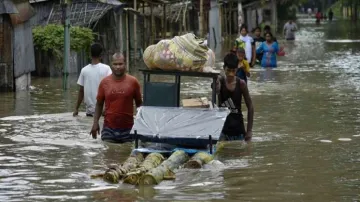Assam has witnessed unprecedented floods this year. Although the floods have been a yearly incident in Assam, this year the conditions deteriorated badly. As of Wednesday a population of 1.7 million across 26 districts was reported to have been under the effect of floods. As many as 92 people have died in landslides, floods and storms in Assam. An area of 38,870.3 hectares of cropland was still inundated as against 49,014.06 hectares on Monday.
The affected districts include Dhubri, Cachar, Kamrup, Goalpara, Lakhimpur, Dibrugarh, Charaideo, South Salmara, Nalbari, Karimganj, Dhemaji, Morigaon, Nagaon, Sivasagar, Golaghat, Sonitpur, Hailakandi, Biswanath, Barpeta, Darrang, Kamrup (M), Majuli, Jorhat, Kokrajhar, Tinsukia and Chirang. Amid these devastating conditions, it is significant to know why such conditions always form and most importantly why floods are a common phenomenon in Assam. Rivers, one way or the other play a role in floods. It must also be noted that there are 11 rivers with their tributaries in which the water level rises during monsoon.
Prominent reasons of floods
Natural reasons:
Heavy rains in upper reaches: Assam is one of the most flood-prone states and one of many reasons is its topography. The rains in China, Arunachal Pradesh and other higher leads to funnel down of unprecedented waterlogging in Assam.
Southwest monsoon: Among other reasons, which also pertains to rains is that the southwest monsoon bring heavy rainfall in the state that leads to a rise in the riverine system of the state. According to the Water Resources Ministry of Assam, 85 per cent of the annual precipitation in the Brahmaputra basin happens during monsoon months.
Man-made causes:
Riverbank erosion: However, apart from natural reasons like rainfall there are also some man-made reasons. One such reason is riverbank erosion. The river bank erosion leads to the expansion of rivers causing floods in the nearby regions. According to some reports, the width of the Brahmaputra river has been enhanced by up to 15 kilometres at some places due to riverbank erosion.
Encroachments: Early in the 1960s, embankments were built to control floods by rising levels of water in rivers, however, over time these embankments were encroached by the local populations, thereby detriment the utility of embankments.
ALSO READ | Assam Floods: Amit Shah dials CM Himanta Sarma, ensures centre's full assistance to flood-ravaged state
